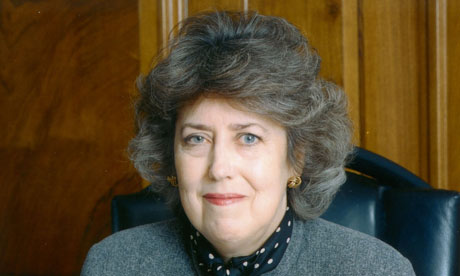Iraq inquiry: Saddam posed very limited threat to UK, ex-MI5 chief says
Eliza Manningham-Buller tells Chilcot inquiry that Iraq invasion radicalised part of a generation of Muslims and increased terrorist threat to Britain

The former MI5 director general Eliza Manningham-Buller today delivered a withering assessment of the case for war against Iraq, saying it had significantly increased the terrorist threat to Britian.
Giving evidence to the Chilcot inquiry, Manningham-Buller said the threat posed by Saddam Hussein before the US-led invasion in 2003 was low.
But the toppling of Saddam allowed Osama bin Laden to gain a stronghold in Iraq and radicalised young Muslims in Britain, she said.
In evidence that undermined the case for war presented by the former prime minister Tony Blair, she was asked whether it was feared Saddam could have linked terrorists to weapons of mass destruction, facilitating their use against the west.
"It certainly wasn't of concern in either the short term or the medium term to me or my colleagues," she replied.
Manningham-Buller said the invasions of Iraq and Afghanistan had radicalised parts of a generation of Muslims who saw the military actions as an "attack on Islam".
She added that, prior to the Iraq invasion, the prospect of it fuelling terrorism in the UK had been communicated through joint intelligence committee reports. She said she had also spoken to the home secretary about the risk.
Manningham-Buller was damning about the impact of the invasion on Iraq, saying the toppling of Saddam had allowed Osama bin Laden and al-Qaida to move in. "Arguably, we gave Osama bin Laden his Iraqi jihad," she added.
She said the focus on Iraq had "reduced the focus on Afghanistan", and was damning in her assessment of every stage of the invasion, from the low threat posed by Iraq and the quality of intelligence provided to the reconstruction process after Saddam was toppled.
Manningham-Buller said there was no evidence of Iraqi involvement in the September 11 attacks on the US, a view she said was shared by the CIA and which prompted the then US defence secretary, Donald Rumsfeld, to set up an alternative intelligence unit.
She revealed that, during a visit to New York, she had tried to persuade Paul Wolfowitz, the then deputy secretary of defence, not to disband the Iraqi army.
Asked whether she had any chance of succeeding, she said: "Not a hope." She said there was "plenty of evidence" that planning for the aftermath of the invasion was "not sufficiently done by the US".
Manningham-Buller said that by 2004, the year after the invasion, the British security services were "overburdened" by intelligence reports on terrorist plots posing a threat to the UK.
That was despite the fact that MI5's budget had been doubled after a request she made to Blair in the autumn of 2003.
To coincide with Manningham-Buller's evidence, a letter she sent to John Gieve (pdf), a permanent secretary at the home office a year before the Iraq invasion, was declassified.
In it, she wrote that there was "no credible evidence" Iraq was implicated in the September 11 attacks, and that Saddam was "unlikely" to order terrorist strikes unless "he perceives that the survival of his regime is threatened". She noted that the Iraqi dictator was more likely to use conventional weapons against targets in the region of Iraq than terrorism or chemical weapons against western states.
In her evidence to the inquiry, she said she had not subsequently changed the opinions expressed in the letter.
She told the panel the joint intelligence committee was "fallible" and "inadequately challenged" on Iraq and that the intelligence used to justify the invasion was not up to scratch.
Manningham-Butler did say that the threat of terrorism "shouldn't stop you from doing what is right" but that will prove scant comfort to the proponents of the war after one of the most damaging sessions of evidence heard at the Chilcot inquiry to date.
Asked by Sir John Chilcot if she had any general reflections, she replied: "The main one would be the danger of going to war on fragmentary intelligence."
Andrew Sparrow's analysis
That was one of the most damaging evidence sessions we've heard. Eliza Manningham-Buller has said before that the Iraq war increased the terrorism threat to the UK, but she has now just made the case more powefully than ever before.
"Arguably we gave Osama bin Laden his Iraqi jihad," Maningham-Buller said, as she revealed that 70 to 80 Britons went to Iraq to join the anti-coalition insurgency having been radicalised by the war.
She said that MI5 had to have its budget doubled after the war because the number of threats was "almost overwhelming". And, in her final remarks, she accused Tony Blair of placing too much credence on "fragmentary intelligence".
But the most significant comments may turn out to be those she made about the links between Iraq and terrorist groups wishing to acquire WMD. Blair went to war, not just because he was worried about what Saddam might do with WMD, but because he was concerned about WMD produced by a country like Iraq falling into the hands of the terrorist group prepared to commit mass murder on the scale of 9/11. Manningham-Buller seemed to be saying that this was not much of a threat.
Our senior political correspondent Andrew Sparrow has been live-blogging the key sessions at the Iraq inquiry. Read his account of Eliza Manningham-Buller's evidence here
http://www.guardian.co.uk/uk/2010/jul/20/iraq-inquiry-saddam-mi5-chief

No comments:
Post a Comment